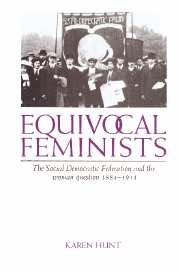Book contents
- Frontmatter
- Contents
- Acknowledgements
- Introduction
- Part 1 The woman question: the theory
- 1 The contribution of the founding fathers
- 2 The SDF's understanding of the woman question
- 3 Understanding the SDF and the woman question
- Part 2 The SDF and the woman question: the theory and practice of the party on aspects of the woman question
- Part 3 Women and the SDF: the practical implications of the SDF's understanding of the woman question
- Conclusion
- Appendices
- Bibliography
- Index
2 - The SDF's understanding of the woman question
Published online by Cambridge University Press: 14 January 2010
- Frontmatter
- Contents
- Acknowledgements
- Introduction
- Part 1 The woman question: the theory
- 1 The contribution of the founding fathers
- 2 The SDF's understanding of the woman question
- 3 Understanding the SDF and the woman question
- Part 2 The SDF and the woman question: the theory and practice of the party on aspects of the woman question
- Part 3 Women and the SDF: the practical implications of the SDF's understanding of the woman question
- Conclusion
- Appendices
- Bibliography
- Index
Summary
This chapter places the woman question within the SDF's understanding of socialism in order to explain how SDFers arrived at their ambivalent position on the relationship between sex and class. Together with an exploration of the range of arguments used within the SDF concerning the nature of women's condition under capitalism and its political implications, this provides a picture of the SDF's understanding of the woman question.
To understand the SDF's position on the woman question one must place it within the wider context. The party's understanding of socialism was essentially an orthodox Second International Marxist one; that is, the crucial divide in society was economic, essentially one of class, and everything else was secondary. This premise led to a narrow definition of the issues which were regarded as crucial to socialist politics. In contrast, a wide variety of other debates, such as those over religion, teetotalism and feminism, were defined as peripheral. As the SDF's columnist, the Tattler, emphasised:
Socialism deals only with the economic question and however much any of us may speculate on the changes in sexual relations that may result from changed economic conditions, the individual making them is responsible for such speculations, and they are to be in nowise regarded as part of socialist teaching.
Anything beyond the strictly economic was a matter for the individual conscience, and as such could not be used to impugn anyone's socialist credentials.
- Type
- Chapter
- Information
- Equivocal FeministsThe Social Democratic Federation and the Woman Question 1884–1911, pp. 37 - 56Publisher: Cambridge University PressPrint publication year: 1996



